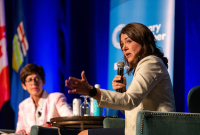Support strong Canadian climate journalism for 2025
Finance Minister Chrystia Freeland is “very confident” the federal government will get back the $34 billion in public funds spent on the Trans Mountain Pipeline expansion. But her statement produced widespread skepticism from opposition MPs.
“If you look at market analysis right now, the consensus view is this is a project that is worth a lot of money,” Freeland said at the natural resources committee meeting Monday.
“$34 billion?” asked NDP MP Charlie Angus.
“Yes,” Freeland replied. “I hope that we’re going to sell it for more.”
Bloc Québécois MP and natural resources critic Mario Simard questioned Freeland’s assertion, pointing out that a 2022 analysis by the Parliamentary Budget Office (PBO) already concluded the federal government is “very unlikely” to recoup the $4.5-billion spent to purchase Trans Mountain expansion (TMX) from Kinder Morgan. The PBO’s analysis was done when construction costs were pegged at $21.4 billion. Since then, costs continued to rise and reached $34.2 billion, according to Trans Mountain’s latest estimate.
The Monday meeting was part of the committee’s ongoing study of the government’s purchase of TMX. Minister of Energy and Natural Resources Jonathan Wilkinson also appeared before the committee.
In 2022, reporting by Canada’s National Observer revealed that secret studies (by TD Securities and BMO Capital Markets) that the federal government relied on to argue TMX is commercially viable are based on the unrealistic assumption the pipeline will operate for 100 years.
That’s “pretty fun math,” Angus said, and asked whether Freeland is basing her statements on that assumption.
In the brief exchange, Freeland said that is not the basis, but did not speak specifically about the confidential TD and BMO reports. Instead, she pointed to the CEO of Trans Mountain’s “confident” testimony and economist Trevor Tombe’s analysis of TMX.
After Freeland left the meeting, Simard asked Finance Canada officials how they explain the contradictory conclusions of the PBO’s analysis that found TMX is a money loser and the BMO and TD reports that used an unrealistic 100-year lifetime to claim commercial viability. The PBO’s findings run counter to Freeland’s assertion “that this is going to be a very profitable project,” Simard said.
Anne David, Finance Canada’s director of corporate finance and asset management, said the minister and department will follow up on Simard’s question.
“The ultimate value of the pipeline will be determined in the market, and acquirers will take into account factors well beyond [the PBO’s] type of analysis,” Greg Reade, assistant deputy minister of the Economic Development and Corporate Finance Branch, told the committee.
“There could be value for different types of buyers, institutional buyers, pension funds, etc,” he said. “There's other ways to think about valuation beyond those analyses.”
Reade said TMX’s cash flow will be sufficient to pay for operating costs, financing costs as well as pay down some of the debt. He did not say how much debt it would cover, and, when pressed on whether the department has gamed out a scenario where debt is written off, said the department hasn’t looked at that.
Finance Canada ensured TMX was completed by providing loan guarantees to banks, meaning if Trans Mountain Corporation can’t repay the loans, it will fall on the public purse. The Canada Energy Regulator is currently hearing arguments about whether the tolls charged to ship oil through the pipeline should be increased and by how much, to account for a portion of the steep cost increases.
“Petro China has just pulled its shipments out of TMX, because they say they're having to pay too much already,” Angus said to Freeland. He referenced a recent report by the International Institute for Sustainable Development that found the federal government is providing a fossil fuel subsidy between $8.7 and $18.8 billion to the oil sector by charging tolls for transportation that do not cover TMX’s costs.
“So are you going to make sure that the companies pay the whole shot coming down the pipe? Or is it going to be the public that continues to subsidize?” Angus asked.
Freeland responded by calling TMX “a profitable nation-building investment in terms of tax revenues, in terms of jobs and in terms of the actual money that we are getting.” She noted that the Canada Energy Regulator will decide the rates oil companies must pay to ship their product on TMX.
“It cost us $34 billion. Are you going to get that money back, or are you going to strike the debt as some kind of national reconciliation, fighting Putin, saving the planet initiative?” Angus asked.
Natasha Bulowski / Local Journalism Initiative / Canada’s National Observer






Comments
Good ol' Charlie. I wish he was NDP leader.
Indeed.
Alberta's successive governments have been an annoying collection of loudmouths on oil for a long, long time. It's time to back their rhetoric with action, namely to buy TMX. At full price.